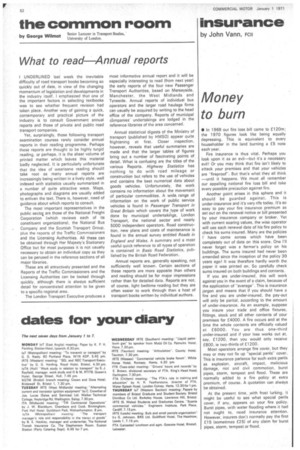insurance
Page 54

If you've noticed an error in this article please click here to report it so we can fix it.
by John Vann, FCII
Money to burn
• In 1969 our fire loss bill came to £120m; the 1970 figures look like being equally depressing. This is equivalent to every householder in the land burning a E5 note each year.
Fire insurance is thus vital. Perhaps you look upon it as an evil—but it's a necessary evil! Or you may think that fire isn't likely to attack your premises and that your vehicles are "fireproof". But that's what they all think —until it happens. We must all remember our appalling national fire loss bill and take every possible precaution against fire.
Another point arises in this sphere and it should be guarded against. This is under-insurance and it's very rife today. It's so easy to pay your fire insurance premium as set out on the renewal notice or bill presented by your insurance company or broker. Yet with current soaring values, the wise operator will use each renewal date of his fire policy to check his sums insured. Many are the policies I have come across which have been completely out of date on this score. One I'll never forget was a farmer's policy on his buildings. The sums insured had never been amended since the inception of the policy 30 years ago! It was therefore hardly worth the paper it was printed on. So carefully check sums insured on both buildings and contents.
If you are under-insured, this will work against you in the event of a claim, because of the application of "average". This is insurance jargon and means that if you should have a fire and you are under-insured, the pay-out will only be partial, according to the amount of under-insurance. As an example, suppose you insure your trade and office fixtures, fittings, stock and all other contents of your premises for £4000. A fire occurs and at the time the whole contents are officially valued at £6000. You are thus one-third under-insured and if your loss works out at, say, £1200, then you would only receive £800, ie two-thirds of £1200.
Most operators arrange fire cover, but they may or may not fix up "special perils" cover. This is insurance parlance for such extra perils as explosion, aircraft, impact, malicious damage, riot and civil commotion, burst pipes, storm, tempest and flood. These are normally added to a fire policy at extra premium, of course. A quotation can always be obtained.
At the present time, with frost lurking, it might be useful to see what special perils cover, if any, appears on your fire policy. Burst pipes, withwater flooding where it had not ought to, need insurance attention. However, insurers don:t normally pay the first £15 (sometimes £25) of any claim for burst pipes, storm, tempest or flood.




















































































